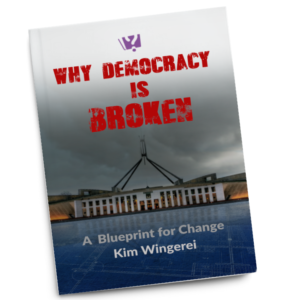Particracy [par-ti-cra-cy]: When party-politics usurp control over democracy.
If this week of political machinations, tactical manouverings and partisan grandstanding hasn’t proved beyond doubt what the real problem with our democracy is, I don’t know what will. We don’t live in a democracy, we live in a particracy.
It is hard to pick the worst example, but Scott Morrison declaring that he would do “whatever it takes” to avoid losing a Parliamentary vote is right up there. The result was that he and his colleagues managed yet again to deny refugees on Manus and Nauru humane treatment.
People don’t matter – politics is more important.
Policy doesn’t matter much, either, politics always takes precedence.
And it wasn’t just Morrison and his band of incompetent brothers (and the odd sister), Labor did their fair share of politicking, too, horse trading with the outrageous electronic surveillance bill to where it passed just so Labor wouldn’t be seen to be obstructionist in the perceived matter of national security.
It all added up to a week in Parliament where the only “achievement” was the Government getting a flawed and unworkable surveillance bill passed with some amendments. The refugees are still in limbo, no progress was made on energy policy and our country remains poorly governed by a bunch of Ministers and back-benchers who are now only interested in holding on to save their jobs, hoping for a miracle between now and May 2019.
As the economy is slowing and the share-market is threatening the implosion many say is overdue, it is hard to see what “miracle” that might be. A perceived terror threat or an actual event – engineered (remember the children overboard affair?), or – God forbid – an unexpected tragedy on which the Government can score political points – Morrison no doubt hankers for a “Tampa” style episode.
Because politics is all about point scoring, and party politics is about winning – not just elections, but winning a debate and a vote in Parliament is an end in itself. People are just voters and policy is merely a bi-product of the politics.
Maybe it is the inevitable consequence of allowing the political party to usurp control over democracy? In ‘modern’ democracy all important policy decisions are made in the party room. Parliament is merely a place of perfunctory debate and where predetermined votes are being held. Grandstanding and shouting matches define the political discourse, not respectful and informed debate.
The Particracy rules.
As voters, the only choice we have is to either vote for an independent who have limited influence except in a “hung” Parliament, or vote for a party delegate whose influence is limited by the party program and enforced by the party whip. This has to change – we need to re-frame the role of the political party.
We need to return to the original idea of democracy as government by the people with our representatives beholden to their constituents, not to their party – where being a representative is a privilege and an immense responsibility, not just a career choice.
I have no doubt that there are many of our Parliamentarians that see it as such, but too many see their role as one of earned entitlement as they move up the ranks of the party hierarchy. Too many have spent their whole career as politicians. Too many pander to donors, mates and special interest groups.
One solution is more direct democracy – once too daunting to contemplate but now well within the realm of possibility using modern communications methods and technology (properly encrypted). Maybe that is an utopia worth striving for.
In the meantime, let’s open the debate to what can be done to change the particracy back to a democracy.







Agree with the misuse and misdirection involved in party politics and also the lack of freedom of our so called ‘representatives’ to vote in the best interests of their constituents.
To change such a system, a rethink is needed. I could never understand how a political party is allowed to control the vote of a democratically elected representative. For that matter, how are they allowed to parachute a candidate of the party’s choice into an electorate without the consent of that electorate?
The only way I can see to change things is to start a movement which will bring democracy to our democracy! That is to have a charter which forbids party or financial control by the few, as is the case at present. So I suppose a new political movement is what I am suggesting, OOOHHHH DEAR!, not another one! The reason I use the word “movement” is that a party is just more of the same. A new approach is needed and your suggestion of a technological answer would be a part of the solution but not all of it. Our representatives need the freedom to agree or disagree as their electorate desires them to and vote with the conscience of that electorate, not the party.
There is a long discussion to be had on this in our country, and we must participate in order to effect some needed change.
Yep – that’s where I am doing my bit having written a book that outlines a concrete plan – no quick fixes, it will take years.